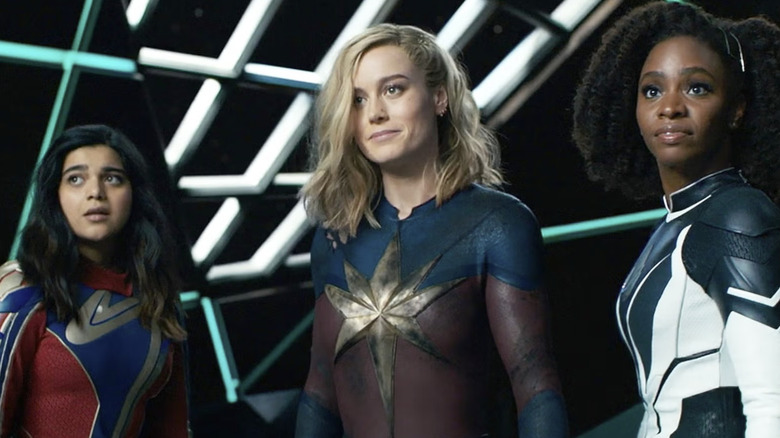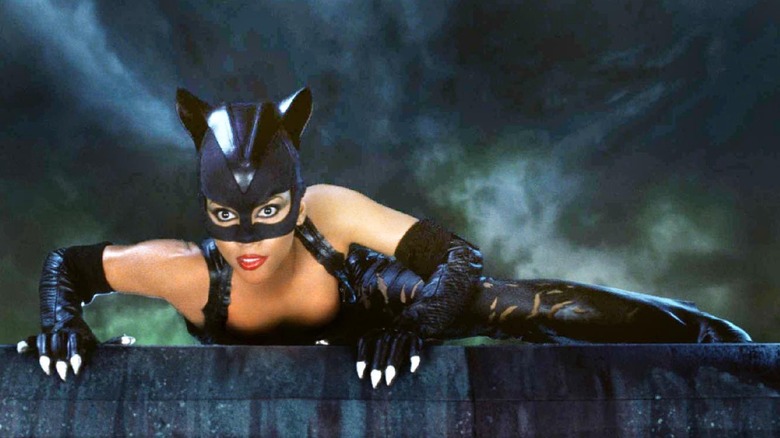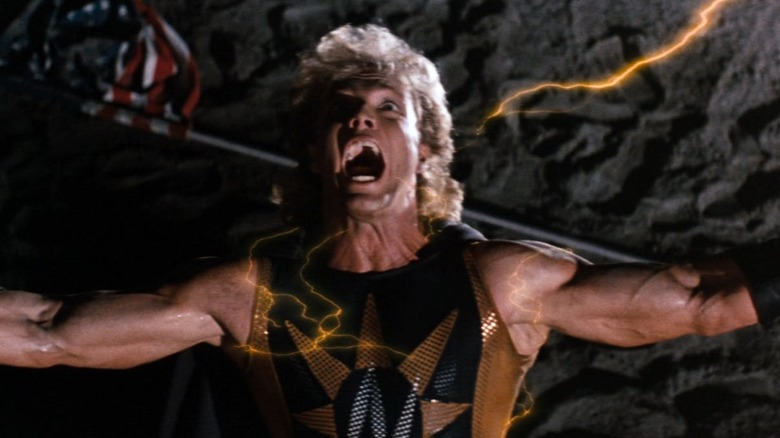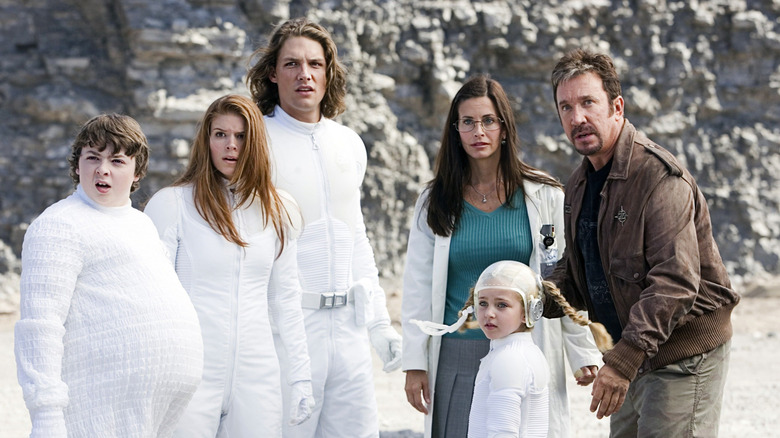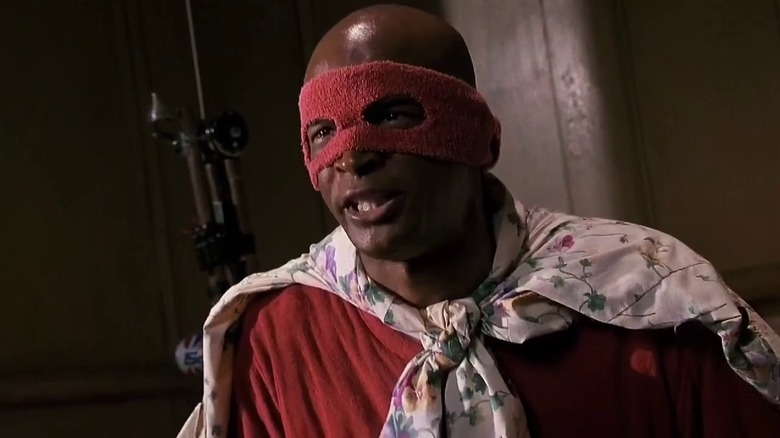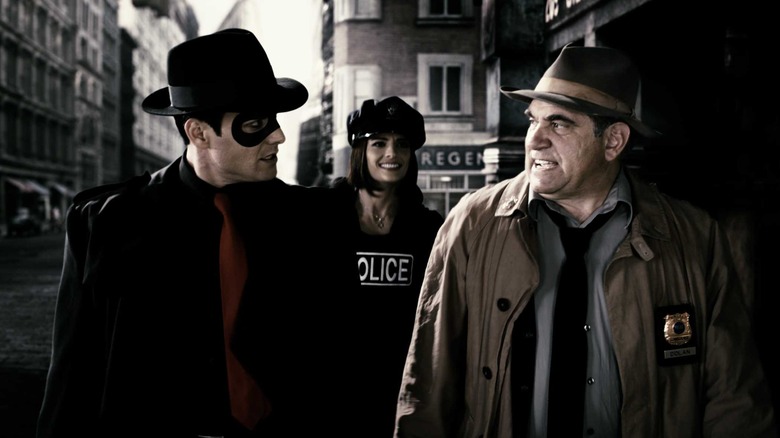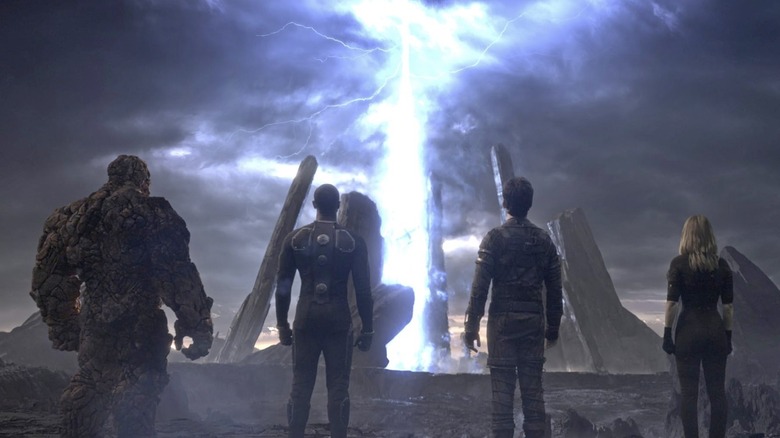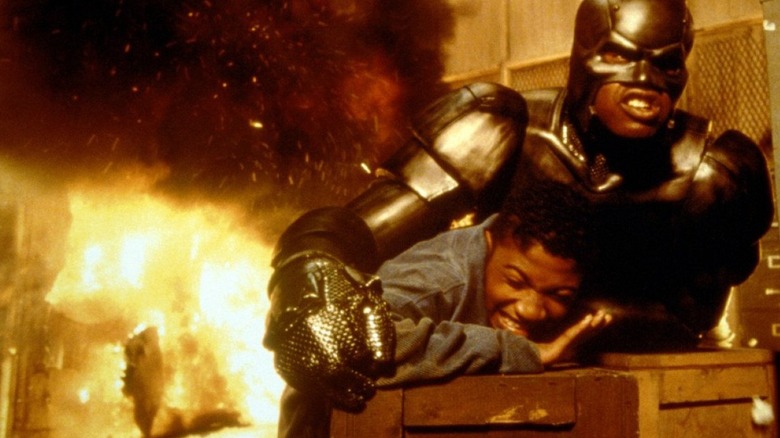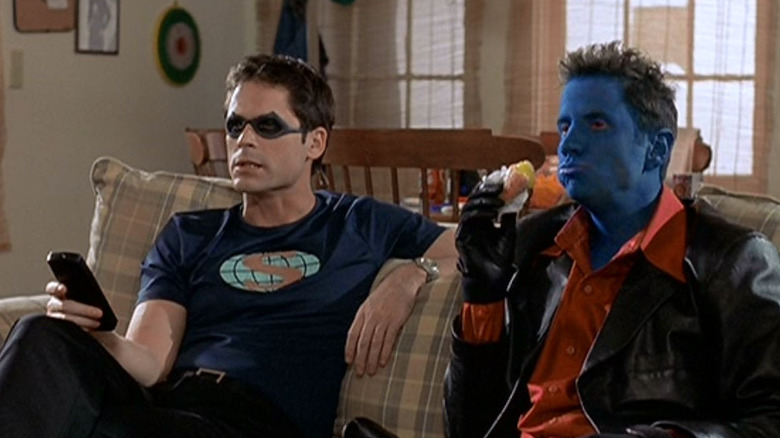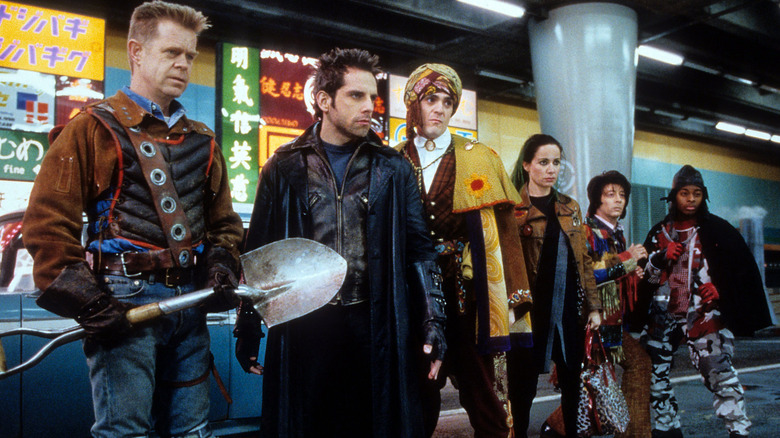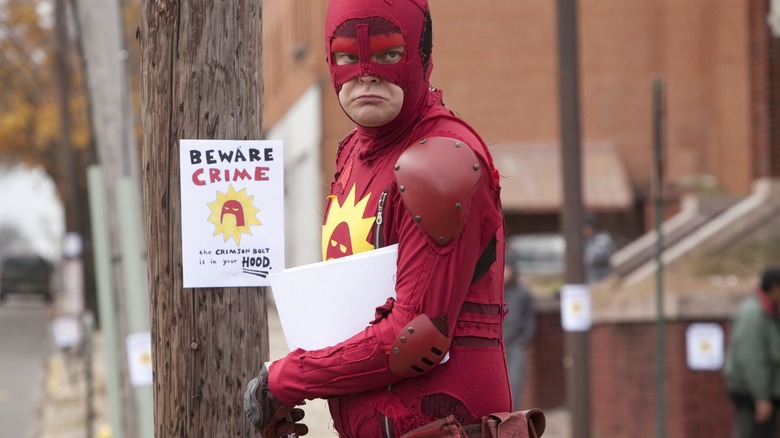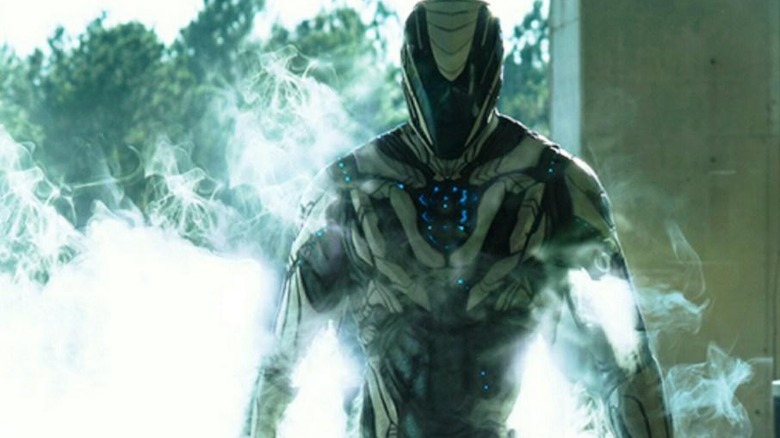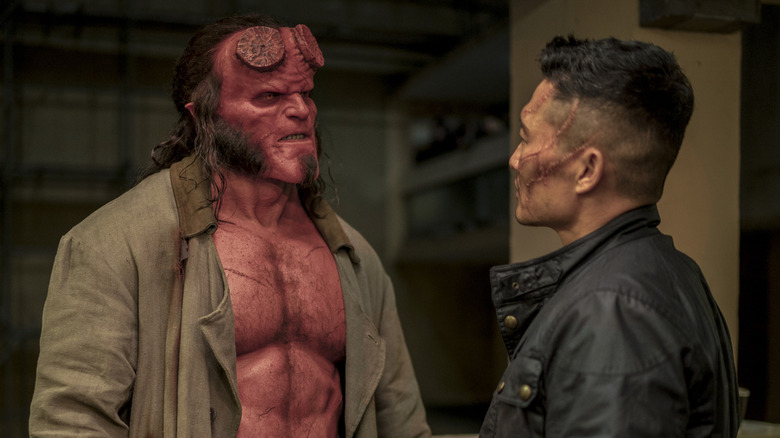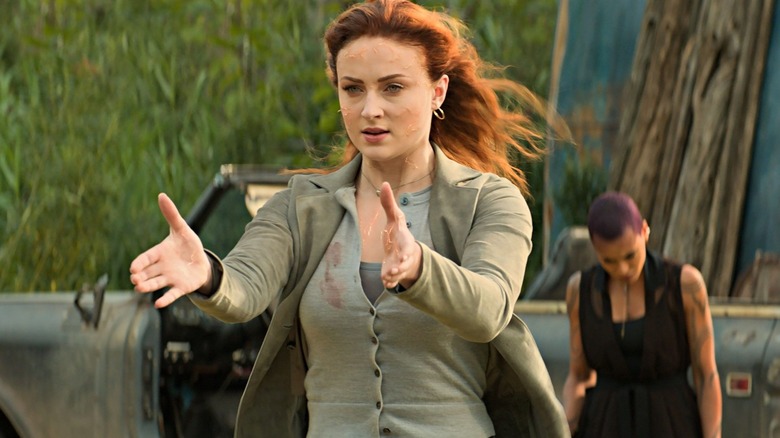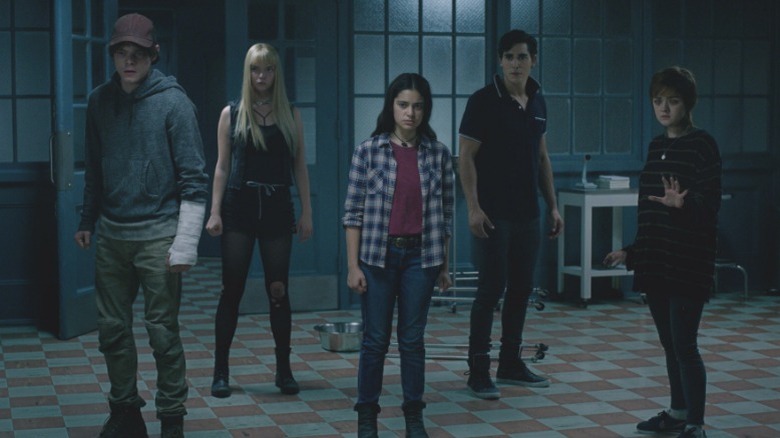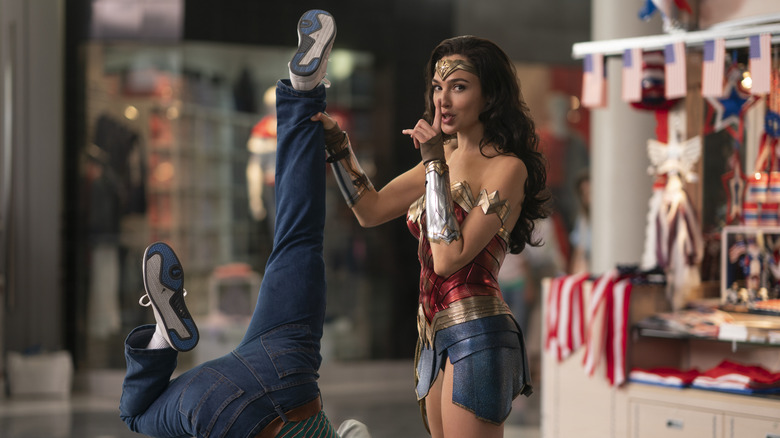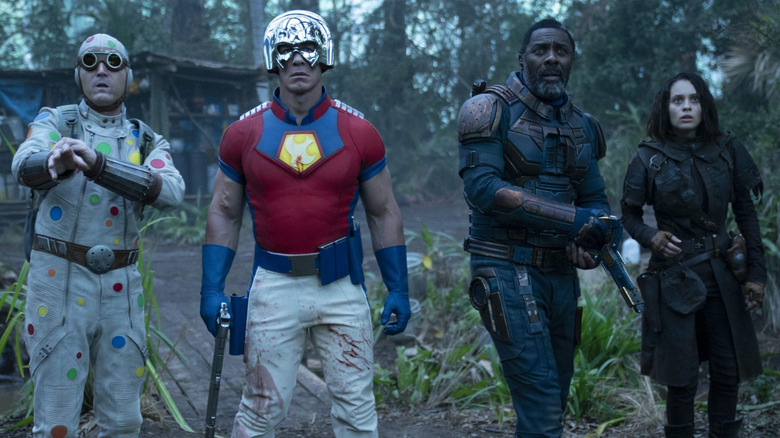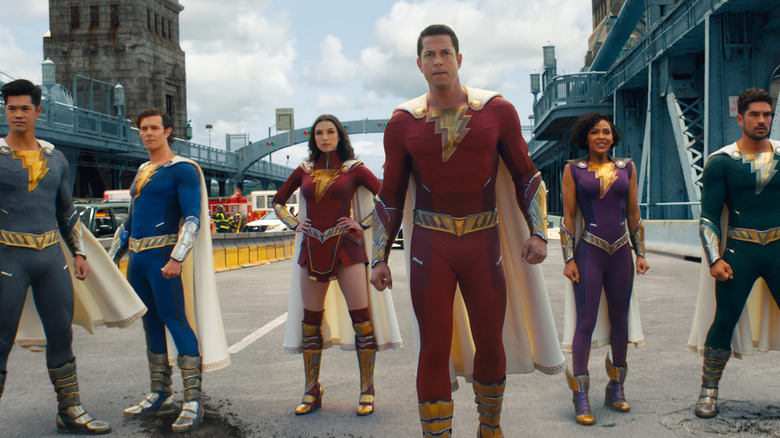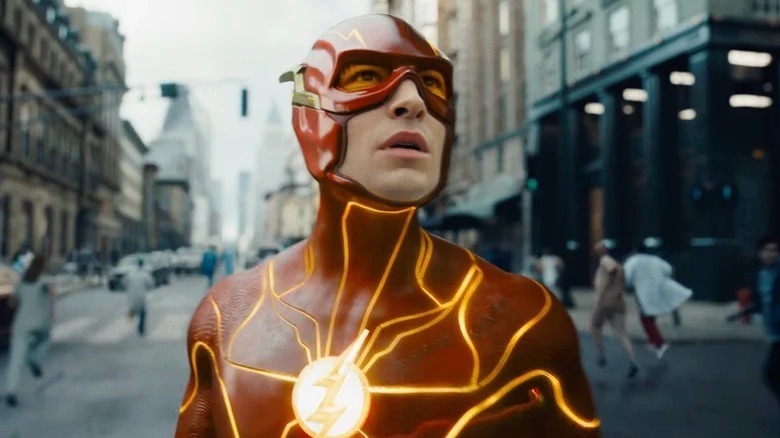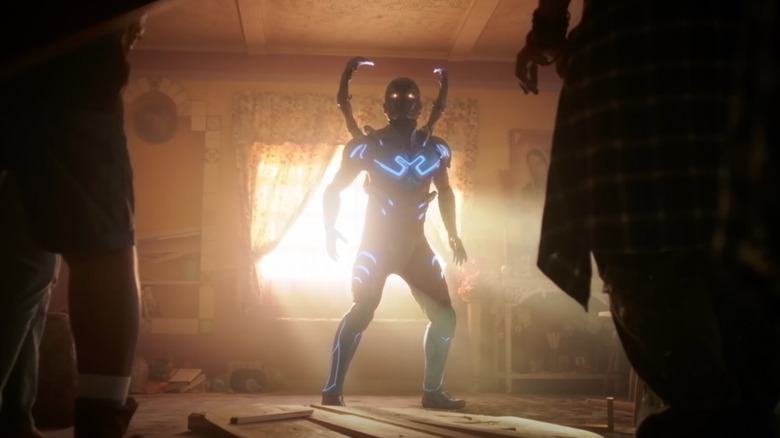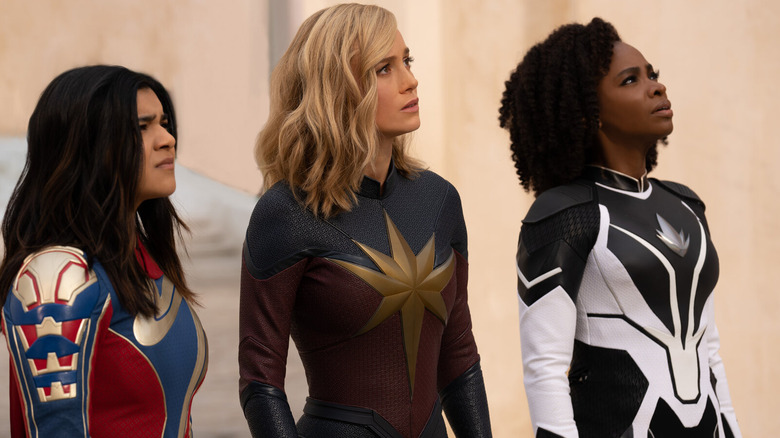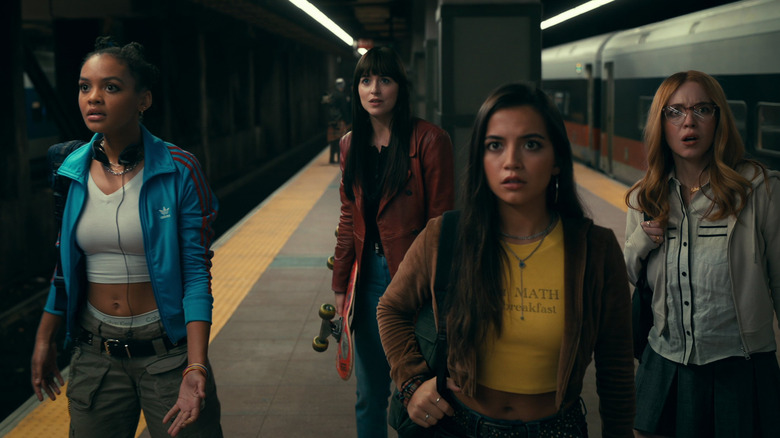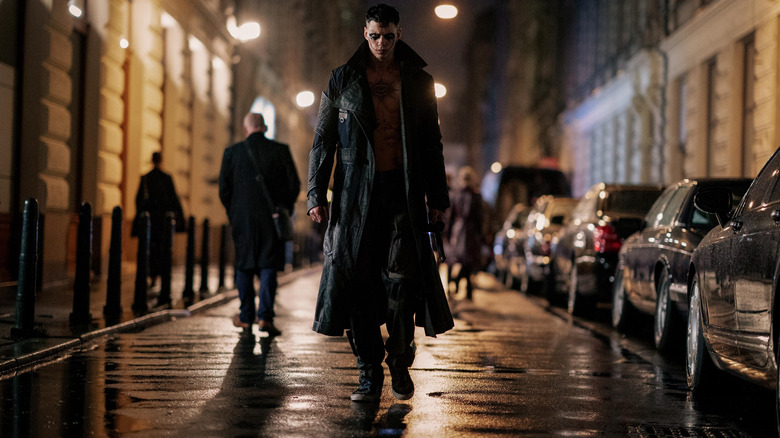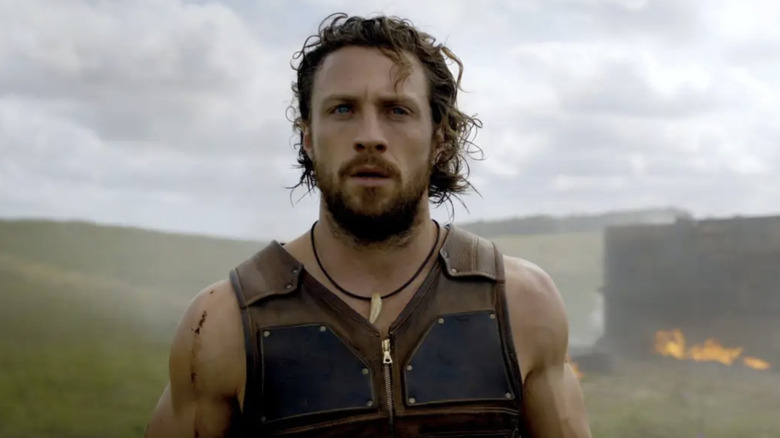Superhero Movies That Bombed The Hardest At The Box Office
As much fun as it may be to trash a movie when it flops, isn't it that much more fun when it's a superhero flick? Along with the usual sadistic joy you can feel when a movie is so obviously a stinker, you get the added benefit of seeing stars in silly outfits. If a superhero movie is a hit, then the stars can afford to look silly. But if it tanks, those tights add a delicious amount of insult to injury. Think about it. If you see a guy on the street trip and fall, you may forget it within minutes. If you see a guy on the street in a chicken suit trip and fall? There is no one at your job, in your family, or connected to your social circle who will not hear that story.
Many of the following movies are the worst of superhero cinema; superhero movies famous for being so awful you can hardly believe they were legal. But they're not all the worst of the worst. Some of them were small, independent films that were never expected to be seen outside an art house, and some suffered from behind-the-scenes turmoil.
Most of them, though? Yeah. Most of them are horrible. Most of them are so bad that if you read their titles out loud three times in front of a mirror, Zack Snyder will appear and ruin your life. Regardless of the reason, here are superhero movies that bombed the hardest at the box office.
Catwoman
Selina Kyle — the Catwoman of the comics — would likely admit that when it comes to robbing the rich of Gotham City, she does it more for the thrill than for the money. Which is good, considering that the stinker of a movie bearing her alias lost $20 million. "Catwoman" deserves its honored spot on any sensible "worst superhero movie" list you could find, and even the people who made it agree. Berry herself called it a "piece of s***, godawful movie" and in February 2018 John Rogers — one of the film's screenwriters — told EW it was a "s*** movie" that had "zero cultural relevance."
With a lead character named Patience Phillips instead of Selina Kyle, a setting that was nowhere near Gotham City, a traditionally non-powered hero imbued with magical cat powers, and without a single whiff of Batman, 2004's "Catwoman" was based on the comics in the same way the "Wreck-It Ralph" franchise is based on the novels of F. Scott Fitzgerald. The army of critics who would rather clean out litter boxes with their own toothbrushes than watch "Catwoman" again cite Pitof's horrible direction, a confused screenplay, and of course Berry's ridiculous outfit that looks like either it was lingerie for the wife from "Coneheads" or simply that Halle Berry lost a bet.
Berry's disaster of a costume was designed by Angus Strathie, who earned an Academy Award for his work on "Moulin Rouge!" a few years previous. Maybe he was tired?
Superman IV: The Quest for Peace
After "Superman III," Christopher Reeve was pretty sure he was done playing the Man of Steel. Unfortunately for Reeve and anyone who saw 1987's "Superman IV: The Quest for Peace, Reeve was wrong.
When Superman goes to the UN and informs the gathered representatives that he plans to destroy all nuclear weapons, rather than the entire world uniting against him (which is what would actually happen), the reps give him a standing ovation. But Lex Luthor (Gene Hackman) isn't quite done with Superman. With a strand of Kal-El's hair attached to a nuclear missile that is launched into the sun, Lex creates Nuclear Man (Mark Pillow), a villain who looks like he was kicked out of the hair metal band Ratt, designed to give Superman radiation sickness with his gold press-on nails.
The budget of "Superman IV" was $17 million; domestically it made less than $16 million. By comparison, 1978's "Superman" made over $130 million domestically, "Superman II" made $108 million, and even "Superman III" had a domestic gross of nearly $60 million. Jon Cryer, who played Lex's nephew Lenny, said "Superman IV" suffered from a budget whittled to nothing. Reeve said the same thing in his 1999 autobiography "Still Me." We trust Reeve and Cryer, but wonder if a richer budget simply would have made "Superman IV" a bigger pile of what it ultimately proved to be.
Zoom
"Zoom" stars Tim Allen as Captain Zoom, a washed out superhero bitter about the loss of his powers to ally-turned-villain Concussion (Kevin Zegers). When Dr. Grant (Chevy Chase) discovers Concussion is returning to threaten the world, he recruits the former Captain Zoom to train a new batch of pubescent recruits. The fledgling team includes Kate Mara as Summer Jones, a young hero with telekinetic and empathic abilities. Almost a decade later, Mara would play Sue Storm in the utterly doomed "Fantastic Four." We're not suggesting Kate Mara's presence curses superhero movies; we're just also not suggesting she doesn't curse superhero movies.
Based on the 2005 children's book "Amazing Adventures from Zoom's Academy" by Jason Lethcoe, 2006's "Zoom" tried to ride the coattails of the budding success of superhero action flicks. More specifically, it was likely trying to share the spoils of the previous year's "Sky High," which featured teenage superheroes in a school just for young superpeople — basically Hogwart's with spandex instead of all those scarves.
Unlike "Sky High," "Zoom" forgot to make money. Its $75 million budget returned a $12.5 million lifetime gross, and according to most of the people who saw it, it deserved its huge loss. The critical scuttlebutt for "Zoom" is that is was boring, bland, lazy, and unoriginal. As Jeannette Catsoulis wrote for The New York Times, "Too infantile for tweens and too stagnant for tots, 'Zoom' bleeds boredom from every frame."
Blankman
When you start looking into superhero movies that bombed, you learn one of the toughest needles to thread is the superhero comedy. It's a lesson Damon Wayans learned with 1994's "Blankman."
Wayans plays Darryl Walker, a technical genius who seems completely oblivious to and naïve about the inner city neighborhood he's grown up in. When mobsters murder Darryl's grandmother, he uses his technical expertise to become the laughable hero Blankman. In spite of his skill at making useful gadgets, Blankman is less adept at crafting a uniform, using a bedsheet as a cape and what appears to be either a headband or a legwarmer as a mask. Eventually, his brother Kevin (David Alan Grier) joins him as sidekick Other Guy.
Wayans was probably hoping to bank on the success of his much more offensive superhero spoof character, the disabled Handi-Man from "In Living Color," but few bothered to show up for "Blankman." Its opening weekend gross was a disappointing $3.7 million, which represented almost half of what the movie would ever make on the screen — its lifetime gross was less than $8 million. Critics took full advantage of the title, like San Francisco Chronicle's Mick LaSalle, who opened his 1995 review of the film's home release with, "The title 'Blankman' should be warning enough: There's nothing there."
The Spirit
You might think that if it was feasible for a comic book creator to make the leap from comics to movies, Frank Miller would be the guy to do it. So much of Miller's comic book work has been used to successfully make hit movies. The "Sin City" and "300" films were based on his work, and his classic graphic novel "Batman: The Dark Knight Returns" was adapted to animation, as was "Batman: Year One." Christopher Nolan's "Batman Begins" was heavily influenced by Miller's work and Netflix's "Daredevil" would have gone absolutely nowhere without it.
But when Miller took the director's chair to adapt "The Spirit," based on the comics by Miller's inspiration and friend Will Eisner about a cop who rises from the grave to fight injustice, everyone seemed to agree Miller should have stuck to the funnybooks. The film's poor showing at the box office was estimated to represent tens of millions of dollars in losses.
"The Spirit" has a dreadful 14% rating on Rotten Tomatoes and most critics think that while the film's visuals are impressive, that's all it has going for it. They describe it as poorly-written, pleasureless, and tone-deaf. Never one to shy away from a zinger if the lack of quality justified it, the late Roger Ebert wrote in his review, "To call the characters cardboard is to insult a useful packing material."
Fantastic Four
"Fantastic Four" was so bad that really, being bad is what it's most famous for. The 2015 reboot of the franchise actually made money once it went overseas, but did horribly in the States. With a $120 million budget, "Fantastic Four" raked in a little over $25.5 million on opening weekend and scraped together a total of $56 million before U.S. theaters had enough and stopped torturing audiences with it.
Critics agreed director Josh Trank had the tools he needed, but didn't use them properly. Rather than a fully developed superhero action film with an engaging story, "Fantastic Four" was, as The Hollywood Reporter's Todd McCarthy put it, "a 100-minute trailer for a movie that never happens." Likewise, Alonso Duralde of The Wrap wrote that Trank "assembled a quartet of engaging, charismatic performers and stranded them in a miasma of exposition and set-up."
After one horrible review after another rolled in, Trank tweeted that his version of the film had been altered by Fox. But sources from the film's production told THR that Trank gave the studio little choice but to step in. The unnamed sources called Trank "erratic" and "isolated," saying that at times he appeared to be "in hiding." Producers Simon Kinberg and Hutch Parker took the reins at the 11th hour, three months before opening, to make sure there was something to put on the screen.
Steel
So you want to make a movie about a C-List Superman spin-off? Well, just because the superhero isn't a household name yet doesn't mean you can't change that. Just make sure you cast the right actor ... so you hire Shaquille O'Neal.
When Superman kind of died in the pages of 1992's "Superman" #75, John Henry Irons built an Iron-Man-esque suit and tried to fill the void Superman left behind. The noble character was unfortunately adapted into 1997's "Steel." Writer/director Kenneth Johnson told Vice he was against the idea of Shaq as the lead from day one, but that the studio "wouldn't budge a dime to place an actual movie star in the role." Still, Johnson said the story of Steel's background appealed to him, as did the fact that the film would bring the world one of the big screen's first African-American superheroes. Speaking of which — "Spawn" star Michael Jai White would beat O'Neal to be the first African-American actor to portray a major comic book superhero in a film by 14 days — "Steel" was released on August 15, 1997, while "Spawn" hit theaters on August 1st.
It's just as well that "Steel" was edged out of that landmark by "Spawn," because as Johnson predicted, Shaq was no Man of Steel. Critics hated "Steel" and audiences would have hated it if they'd bothered to see it. With a relatively small budget of $16 million, "Steel" didn't quite hit $2 million. Sometimes you have to spend it to make it.
The Specials
We're not sure what the production budget was for 2000's "The Specials," but considering that domestically it was only released in two theaters and made a lifetime gross of just over $13,000, it probably didn't make a profit. While "The Specials" was a superhero movie, there was no action, no adventure, and no stunning special effects. The film was supposed to be something of a faux documentary, following one of the world's least popular superhero teams on their day off.
Though he didn't direct "The Specials," DC supremo James Gunn wrote the film, and what little we know about the behind-the-scenes mess comes from the DVD's commentary track. Gunn spews his displeasure with director Craig Mazin for not understanding his vision and Rob Lowe for trashing the film. He also apparently got into a fistfight with Jamie Kennedy outside an Astro Burger.
What few reviews surfaced weren't glowing. Nikki Tranter of PopMatters said what the film actually gives you is a long "'Saturday Night Live' sketch, with most of the actors completely overdoing every scene." The A.V. Club's Nathan Rabin had a more generous view of "The Specials," writing in 2005 that the film was released too early and that the "spectacular comeback" of superhero flicks would have rendered the film more relevant. Considering that by 2005 the first "Iron Man" had yet to be released, it's tempting to consider whether or not "The Specials" could find broader audiences today.
Mystery Men
In 1999, there was every reason to think the superhero comedy "Mystery Men" would be a hit. Ben Stiller starred as Mr. Furious — team leader with questionable "super" credentials — and he still had fans repeating lines from the previous year's comedy smash "There's Something About Mary." Hank Azaria — appearing as the cutlery-wielding Blue Raja — was a regular fixture on "The Simpsons" and the popular sitcom "Mad About You." Greg Kinnear made a brief but memorable appearance as Captain Amazing, and he was still riding a high from 1997's "As Good as It Gets." And Geoffrey Rush — still fresh on everyone's mind from the previous year's "Shakespeare in Love" — played the perfectly-named supervillain Casanova Frankenstein. Throw in Paul Reubens as a hero who fights with flatulence and the support of Smash Mouth's infectious tune "All Star" and what could go wrong?
Apparently, plenty could go wrong. "Mystery Men" cost close to $70 million to make, and its lifetime gross was $33.5 million, not even halfway to breaking even. In spite of its comedic star power, the film's greatest crime was its inconsistency. It had moments of comedy brilliance, but you needed to sit through far too much ho-hum to get there. Roger Ebert called it "a long, shapeless, undisciplined mess" that occasionally "generates a big laugh." Even reviewers who gave positive reviews, like Entertainment Weekly's Lisa Schwarzbaum, tempered their praise with warnings like, "Call 'Mystery Men' a sketchbook in search of a movie, it's still a super idea."
Super
While James Gunn wrote "The Specials," it was 2010's "Super" that marked his first shot at directing a superhero movie, and it was much less conventional than his "Guardians of the Galaxy" films. "The Office" star Rainn Wilson plays Frank Darbo, a lonely short order cook whose sanity takes a hard left turn when his wife Sarah (Liv Tyler) leaves him for criminal and strip club owner Jacques (Kevin Bacon). Inspired in part by a Christian TV personality who dresses like a superhero (played by Nathan Fillion) and a bizarre hentai-induced hallucination, Frank becomes the Crimson Bolt, a guy who will beat you half to death if you're a child molester or if you cut in line at a theater.
Critics didn't hate "Super," but they sure didn't love it. Most felt that the film didn't really know what kind of movie it wanted to be. In particular, the movie's often surprising brutality confused its comic tone. Roger Ebert wrote of the death scene for Frank's sidekick Libby (Ellen Page), "Maybe writer-director James Gunn intended it as a joke, but after the camera lingers on [Libby] with a third of her face blown off, it's hard to laugh."
"Super" was an independent film that was never meant to set the world on fire and never expected to. But it didn't even manage to earn back its meager $2.5 million budget. Its lifetime gross was just over $300,000.
Max Steel
Sometimes, something as innocuous as an action figure can inspire creativity with impact that's felt for decades. And then there's "Max Steel," a 2016 film based on the Mattel action figure line and long-running TV series of the same name. Starring Ben Winchell as teenage hero Max McGrath, "Max Steel" is about a boy who stumbles upon an alien robot who can bond with him and give them both extraordinary abilities. It's kind of like "Venom," but instead of a sentient oil slick, Max's alien half is more like that annoying drone Peter Dinklage used to voice in "Destiny."
Unlike the mostly-panned "Venom," which helped to prove a film can get spat upon by critics and still be a box office hit, the zero percent rating that "Max Steel" has on Rotten Tomatoes was reflected in the film's tiny lifetime gross of $6 million.
One critic felt "Max Steel" was more than just a bad movie; it was a desperate cry for social action. While most of the film's cast are relative unknowns, The Hollywood Reporter's Frank Scheck pointed out the bizarre crime that "Max Steel" managed to rope in Andy Garcia as the villain and Maria Bello as the hero's mother. Writing that he understood the need for actors to pay their bills like anyone else, Scheck suggested that "a fund could be started to spare talented thespians this sort of career embarrassment."
Hellboy
Rebooting "Hellboy" after the enormously popular Guillermo del Toro "Hellboy" films was always going to be a difficult task. However, the 2019 "Hellboy" feature exacerbated all those difficulties by going the lazy route of reimagining this character as just a knock-off of Deadpool who engages in lots of cheap-looking, ultra-violent fight scenes. Unsurprisingly, audiences weren't very interested in a take on Hellboy that had this kind of off-putting aesthetic. Released just two weeks before "Avengers: Endgame" redefined the level of success superhero movies could experience at the box office, the 2019 "Hellboy" only grossed $21.9 million at the domestic box office and accumulated a pitiful $33 million overseas for a $55 million worldwide haul.
Needless to say, on a $50 million budget, "Hellboy" was a catastrophic failure, with its entire North American performance coming up short compared to the domestic opening weekend of "Hellboy II: The Golden Army" from a decade earlier. The reasons for this film flopping aren't really a mystery; being so derivative of other popular superhero movies ensured that this version of Hellboy just looked too familiar to the general public. It didn't help that reviews were absolutely atrocious, which only hammered home the toxic reputation surrounding this remake. It was never going to be easy to do a "Hellboy" reboot, but few could have ever imagined that such an endeavor would go as poorly financially as this one.
Dark Phoenix
The original "X-Men" in 2000 broke new box office ground by becoming the first-ever Marvel Comics movie adaptation to exceed $100 million at the domestic box office. It was a significant achievement that signaled how popular these movies could become with the general public and served as an omen for the box office hauls of later films like "Spider-Man" and "The Avengers."
Nearly two decades later, "Dark Phoenix" brought the big screen "X-Men" saga to a close with a box office flop that became the stuff of legend. "X-Men" showed just how huge Marvel movies could be, while "Dark Phoenix" demonstrated how even projects with well-known Marvel superheroes can tank at the box office.
"Dark Phoenix" grossed only $252.4 million worldwide on a $200 million budget, making just $65.8 million in North America. That was a haul roughly on par with the domestic opening weekend of "X-Men: Apocalypse" from just three years earlier. It was also the first time a proper "X-Men" film made under $100 million at the domestic box office, with cheaper, R-rated fare like "Deadpool" and "Logan" doing circles around "Dark Phoenix." With these dismal box office numbers, it was abundantly clear the end had arrived for the "X-Men" saga, as this once mighty franchise went down in flames.
The New Mutants
Movie theaters around the world shut down in March 2020 in response to the COVID-19 pandemic. As soon as they closed their doors, speculation about when they would reopen began. Similarly rampant were rumors about what movies would usher in the reopening of the big screen experience in the wake of this health crisis. In August 2020, brand-new theatrical releases began to trickle into movie theaters, though they were far from the blockbuster titans that dominated the box office in pre-pandemic times. One of the releases that dove into the treacherous world of COVID-era moviegoing was "The New Mutants," which bowed in late August 2020.
Unsurprisingly, given that there were a limited number of movie theaters even open in North America at the time, "The New Mutants" cratered at the box office, grossing only $49 million worldwide. On a $67 million budget, it made nowhere near enough globally to turn a profit and came in far below all other "X-Men" projects at the box office. Even without the presence of COVID-19, though, it was always going to be a challenge for "The New Mutants" to attract audiences with its unusual mix of horror movie scares and superhero movie antics. An unprecedented health crisis only heightened the box office hurdles that "The New Mutants" faced during its theatrical run.
Wonder Woman 1984
Under normal circumstances, a sequel to the 2017 film "Wonder Woman" would have been a box office juggernaut to be reckoned with. Grossing just over $817 million worldwide on a $150 million budget, "Wonder Woman" was an incredibly lucrative enterprise that also drew an enormous amount of positive goodwill from the general public. People were clamoring for more from this character. However, the sequel arrived in theaters on Christmas Day 2020, at a time when the COVID-19 pandemic had shut down a significant number of multiplexes in North America. Plus, the film was sent to HBO Max the same day it hit theaters, a move that shattered its box office potential.
Unsurprisingly, the $200 million-budgeted "Wonder Woman 1984" was a box office non-starter, making just $169 million worldwide, a fraction of its predecessor's gross. It especially suffered in domestic markets, where it grossed only $46.8 million. That's less than half the amount that the first "Wonder Woman" film made during its opening weekend. We'll never know if the promise of seeing Wonder Woman duke it out with Pedro Pascal's Maxwell Lord and his wish-granting stone would've been as enticing to the public as the first "Wonder Woman," thanks to "Wonder Woman 1984" having to navigate so many unprecedented obstacles in its theatrical run.
The Suicide Squad
In the history of superhero movie box office bombs, it's typical to see the biggest money-losers in this domain also be critically savaged projects that have minimal fanbases. The likes of "Dark Phoenix" and 2015's "Fantastic Four" are not titles that people like even ironically, they're just big budget disasters too devoid of creativity to garner significant cult followings. That makes the box office trajectory of "The Suicide Squad" incredibly curious. Critics were generally over the moon about James Gunn's first foray into directing a DC Comics adaptation, but the movie itself was a massive financial failure and one of 2021's most sizable misfires at the box office.
Costing a staggering $185 million to realize, "The Suicide Squad" took in only $168 million worldwide, a dismal amount that included a paltry $55.8 million from domestic territories. The decision to release "The Suicide Squad" simultaneously in theaters and on HBO Max did it no favors, but there was more going on here than just a botched release strategy. The marketing campaign was generic and somewhat confusing (nobody was sure if this was a sequel or a reboot), and a restrictive R-rating kept many fans of characters like Harley Quinn from seeing the film on the big screen. Positive reviews could not prevent this project from becoming a costly box office dud.
Shazam! Fury of the Gods
Grossing over $367 million on a $100 million budget, the original "Shazam!" may not have been a barn-burner at the box office, but it was a very profitable enterprise that showed the value of investing in mid-budget superhero fare. A sequel was inevitable, especially with the dense mythos of supporting players and villains from decades of "Shazam!" comics. However, many factors, including the COVID-19 pandemic, led to "Shazam! Fury of the Gods" arriving a whopping four years after its predecessor first hit theaters. By this time, the superhero movie landscape had changed drastically and the buzz of the original "Shazam!" had long vanished.
In its box office run, "Shazam! Fury of the Gods" only grossed $133.8 million worldwide, making just $57.6 million domestically. It was a disastrous haul, especially given the project's $125 million budget. In North America, "Fury of the Gods" barely outgrossed the domestic opening weekend of the original "Shazam!," a perfect encapsulation of how far this franchise had fallen in just four years. Waiting so long to deliver a sequel didn't help "Fury of the Gods," and an awkward March 2023 release date only made matters worse — it dropped on the same day as the Adam Driver-led dinosaur thriller "65" and was soon followed by "John Wick: Chapter 4" and "Dungeons and Dragons: Honor Among Thieves," so moviegoers seemingly chose to spend their money on other pictures.
The Flash
In August 2022, Warner Bros. Discovery CEO David Zaslav publicly stated that "The Flash" was one of the best DC movies that Warner Bros. had on its near-future release docket. So began a lengthy publicity blitz where Warner Bros. execs discussed "The Flash" as being a can't-miss movie event, something that was going to change superhero films forever.
While this may have seemed like a smart way to drum up buzz for a tormented project (some thought the film would be scrapped or at least recast after troubling allegations surrounding star Ezra Miller emerged), it only succeeded in creating a puzzling aura around "The Flash." Here was a movie where all the positive publicity seemed to be coming from executives with a vested financial interest in its success.
Despite nearly a year of public hype from Warner Bros. brass, "The Flash" bombed hard at the box office. It cost at least $200 million to make (reports suggest that a further $100 million was pumped into the marketing in an effort to make it a success), but it became clear pretty quickly that the film was beyond rescuing. "The Flash" made approximately $55 million during its first three days, and things went downhill fast after that. As Variety reported, the DC movie "suffered a brutal 73% decline in its second weekend with $15.3 million from 4,265 North American theaters. That's a far bigger drop than recent DC adaptations."
Blue Beetle
The DC Extended Universe's penultimate movie, ironically, established a brand new superhero in the form of "Blue Beetle." This Angel Manuel Soto directorial effort spent a hefty $120 million to realize the saga of Jaime Reyes/Blue Beetle (Xolo Maridueña) on the silver screen for the first time. Unfortunately, like the other three DC Extended Universe titles that dropped in 2023, "Blue Beetle" came up significantly short at the box office. Its domestic gross only measured up to $73 million, only a little more than half of what "Shazam!" grossed in 2019. There would be no overseas salvation for "Blue Beetle" either, as it only earned $131 million worldwide. This made "Blue Beetle" the lowest-grossing film in the history of the DC Extended Universe, even beneath films like "Wonder Woman 1984" that had simultaneous domestic streaming launches on HBO Max.
"Blue Beetle" had a lot going against it, including an overdose of 2023 DC movies that ensured it couldn't stand out as something special to general moviegoers. Severe weather over its opening weekend and a pair of Hollywood strikes also ensured that awareness was lower for the production compared to other superhero titles. Competition from late summer 2023 titles like "Barbie" and "Oppenheimer" also couldn't have helped this troubled production. Unlike many lead characters of superhero movie flops, though, the star of "Blue Beetle" got some post-release redemption. This came through James Gunn promising this version of Reyes/Blue Beetle would enter the new DC Universe.
The Marvels
With "The Marvels," the Marvel Cinematic Universe experienced its first out-and-out box office bomb. Not only that, but "The Marvels" was the first MCU entry to gross under $100 million in its entire domestic run, only taking in $85 million. With an equally meager $122 million overseas, the title only earned $206 million at the global box office. On a massive $270 million budget, losses for "The Marvels" were estimated to total a staggering $237 million. This made "The Marvels" one of the biggest box office bombs in history. This staggering misfire came down to a lot of factors, including a weird title that didn't let audiences know instantly this was a sequel to "Captain Marvel," plus the absence of a clear, compelling new villain to market.
More pressingly, "The Marvels" showed what happens when Marvel Studios relies too heavily on its streaming TV shows from Disney+. "WandaVision" and "Ms. Marvel" were must-watch series to understand anything in "The Marvels." That clearly made the movie impentrable to many. The three lead actors not being able to promote the movie due to the 2023 SAG-AFTRA strike also hindered its box office potential, not to mention lingering audience resentment towards the MCU after 2023 boondoggles like "Secret Invasion" and "Ant-Man and the Wasp: Quantumania." Superhero movies had failed before "The Marvels," but none of them were quite this massive in their losses.
Madame Web
"Her web connects them all," according to "Madame Web's" mythic tagline. This, along with the deployment of a villain dressed up as a black-garbed version of Spider-Man, were flagrant attempts to get moviegoers invested in "Madame Web" as some grand unifier of various comic book movie properties. That didn't do anything to move the needle on audience interest in a movie more famous for spawning memes instead of profits. The film's worldwide box office haul only reached $100.5 million, including just $44 million in North America. That domestic gross was just a few million above the domestic opening weekend of "Morbius" two years earlier. While costing a more modest (by superhero movie standards) $80 million, "Madame Web" was a significant money-loser for Sony/Columbia Pictures.
There was no secret reason why "Madame Web" flopped so badly. A terrible marketing campaign and a tremendous lack of positive buzz surrounding its release was always going to hurt it. The movie's dire lack of action sequences or costumed superheroes also ensured that audiences who did show up to "Madame Web" would have nothing kind to say about it once they left the theater. Plus, Madame Web is an obscure Marvel character, so the movie needed an inspired take akin to 2014's "Guardians of the Galaxy" to hook moviegoers. Needless to say, director S.J. Clarkson's final product did not deliver on that front. At least we'll always have that "he was in the Amazon with my mom" line from the "Madame Web" trailer.
The Crow
Among 2024's superhero movie box office bombs, it's easy to forget "The Crow" even existed. This update on the comic book character, previously adapted for a 1994 cult classic anchored by Brandon Lee, enlisted Bill Skarsgård to play a new incarnation of The Crow. Arriving in theaters in late August 2024 with ads that mainly promised lots of violence, the film proved to be a box office disaster. On a $50 million budget, "The Crow" only grossed $24 million worldwide. That included a catastrophic $9.3 million domestically, making "The Crow" one of the lowest-grossing wide release superhero movies launched in the 21st century. Even the original "Crow" made more in North America, and that's before taking inflation into account.
"The Crow" ran into that constant problem many modern remakes can't overcome. What executives see as an "easy" exploitation of a brand name is instead hampered by a recognizable moniker. Folks who remembered the original "Crow" didn't want a remake, while the marketing campaign didn't give any indication to newcomers what it was about or why people should care beyond the pop culture legacy of the original movie. It was a classic case of a remake serving no segment of the audience. "The Crow" also opened only a few weeks into the lucrative box office run of "Deadpool and Wolverine," ensuring it couldn't soar as the only R-rated superhero movie in the marketplace.
Kraven the Hunter
Sony's Spider-Man Universe went out with an especially pitiful whimper in December 2024 with "Kraven the Hunter." Arriving in theaters nearly two years after its original January 2023 release date, it didn't prove to be worth the wait for either moviegoers or Sony executives. In its worldwide run, "Kraven the Hunter" pulled in an anemic $62 million on a $110 million budget. Its North American haul of $25 million was just $1.1 million ahead of what "The New Mutants" grossed four years earlier, making it one of the lowest-grossing Marvel Comics movie adaptations ever in North America.
Beyond just Marvel properties, "Kraven the Hunter" also came in behind other comic book movies like "The Shadow," "R.I.P.D.," "Catwoman," and "The King's Man." And the embarrassing box office statistics haven't ended for "Kraven," a massively expensive modern comic book movie that made less in North America than "Air Bud."
Fans just weren't interested in seeing a movie about Kraven the Hunter that didn't involve his comic book nemesis Spider-Man. Plus Sony's Spider-Man Universe had already delivered so many poor movies before "Kraven," including "Morbius" and "Madame Web," that audiences who had been burned before weren't looking to replicate the experience. On top of everything else, "Kraven" had disastrous reviews that warded off any potential moviegoers from checking it out over the holiday season. One of 2024's biggest bombs, it's no wonder "Kraven the Hunter" slaughtered Sony's Spider-Man Universe.
